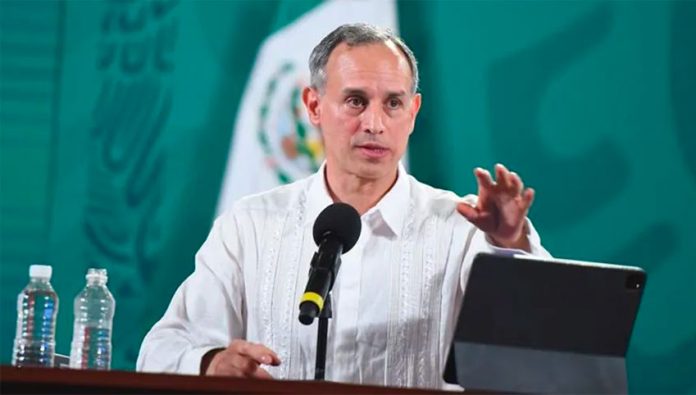Starting in April, up to 600,000 seniors per day will be vaccinated against Covid-19, Deputy Health Minister Hugo López-Gatell said Monday.
Appearing in person at the Health Ministry’s nightly coronavirus press briefing for the first time since recovering from his own bout with Covid-19, López-Gatell said vaccinations will accelerate because Mexico will begin receiving greater quantities of vaccines at the start of next month.
“Starting in April we’re going to have practically double the [current] weekly or monthly supply of vaccines,” the coronavirus point man said, adding that the government’s vaccination brigades will focus on inoculating people in the country’s large cities.
“We’re going to be able to include the state capitals [in the vaccination program] – cities that have one, two, three or five million people; we’re going to be able to go into them and cover a whole city in the course of eight days,” López-Gatell said, referring to universal vaccination of seniors, not the entire adult population.
The application of 600,000 doses per day would allow the inoculation of 18 million people, meaning that the government would achieve its new goal of giving at least one shot to the nation’s approximately 15 million seniors by the end of next month.
President López Obrador said Monday that all of Mexico’s seniors will receive at least one dose by the end of April, a target that has shifted several times. The initial promise was that seniors over 60 would be fully vaccinated by the end of March.
The new goal is still ambitious considering that only 2.95 million seniors have so far received a dose, according to Health Ministry data presented Monday night. To inoculate 15 million by April 30, an average of about 260,000 doses will have to be administered each and every day until the end of next month. It appears that the lion’s share of the work will occur next month.
Only 52,228 doses were administered on Monday, according to preliminary Health Ministry data, lifting the total number of shots given to just over 4.4 million.
In addition to the 2.9 million seniors, about 829,000 health workers have been inoculated, including more than 590,000 who have received two vaccine doses, and over 17,000 teachers are fully vaccinated. Mexico has now received almost 7.2 million doses after a shipment of 667,875 Pfizer shots arrived in Mexico City Tuesday morning.
Foreign Minister Marcelo Ebrard said Tuesday that the United States will provide information on Friday about sending AstraZeneca vaccines – of which the U.S. has stocks but is not using it to inoculate citizens – to Mexico.
“We’re going to have a response on Friday and we’ll provide details that day,” Ebrard said, adding that “good progress” has been made in discussions with the U.S.

He didn’t reveal how many AstraZeneca shots Mexico might receive or how much it would pay for them, but the government has asked for as many as possible. López Obrador said Sunday that he was confident that the U.S. would supply Covid-19 vaccines to Mexico as China, Russia and India have already done.
Unlike the U.S., Mexico has approved the use of the AstraZeneca vaccine and López-Gatell said last week that it would continue to be used here despite several European countries temporarily suspending its use while the development of blood clots among a small number of recipients is investigated.
He predicted Monday that the World Health Organization (WHO) would soon issue a report ruling out links between the vaccine and thrombosis.
WHO director general Tedros Adhanom Ghebreyesus said Monday that the thrombosis cases are not necessarily linked to vaccination, but it’s routine practice to investigate them.
“So far it doesn’t look like there are more cases than would be expected for the period in the general population,” said WHO assistant director general Mariângela Batista Galvão Simão.
Mexico has so far only received one shipment of 870,000 AstraZeneca shots that were manufactured by the Serum Institute of India. It will receive another shipment of more than 1 million doses from India and also has an agreement to purchase more than 40 million shots that will be manufactured in Argentina and bottled here.
The Pfizer, Sinovac and Sputnik V shots have also been used in Mexico while China’s single-jab CanSino vaccine has been approved by the federal health regulator but has not yet been administered.
Meanwhile, Mexico’s accumulated case tally rose by just 1,439 on Monday to just under 2.17 million. It was the lowest single-day case tally since May 11 last year when 1,305 cases were reported.
The official Covid-19 death toll increased to 194,944 with 234 additional fatalities. It was just the third time this year that the daily reported death toll was below 300 after 220 fatalities were registered on Sunday and 247 were added the same day a week earlier.
Source: El Economista (sp), Reforma (sp), Milenio (sp)
